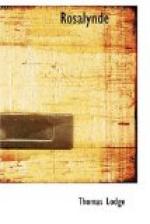Learn with the ant in summer
to provide;
Drive with the
bee the drone from out thy hive:
Build like the swallow in
the summer tide;
Spare not too
much, my son, but sparing thrive:
Be poor in folly, rich in
all but sin:
So by thy death thy glory
shall begin.
Saladyne having thus set up the schedule, and hanged about his father’s hearse many passionate poems, that France might suppose him to be passing sorrowful, he clad himself and his brothers all in black, and in such sable suits discoursed his grief: but as the hyena when she mourns is then most guileful, so Saladyne under this show of grief shadowed a heart full of contented thoughts: the tiger, though he hide his claws, will at last discover his rapine: the lion’s looks are not the maps of his meaning, nor a man’s physnomy is not the display of his secrets. Fire cannot be hid in the straw, nor the nature of man so concealed, but at last it will have his course: nurture and art may do much, but that natura naturans, which by propagation is ingrafted in the heart, will be at last perforce predominant according to the old verse:
Naturam expellas furca, tamen usque recurret.
So fared it with Saladyne, for after a month’s mourning was passed, he fell to consideration of his father’s testament; how he had bequeathed more to his younger brothers than himself, that Rosader was his father’s darling, but now under his tuition, that as yet they were not come to years, and he being their guardian, might, if not defraud them of their due, yet make such havoc of their legacies and lands, as they should be a great deal the lighter: whereupon he began thus to meditate with himself:
SALADYNE’S MEDITATION WITH HIMSELF
“Saladyne, how art thou disquieted in thy thoughts, and perplexed with a world of restless passions, having thy mind troubled with the tenor of thy father’s testament, and thy heart fired with the hope of present preferment! By the one thou art counselled to content thee with thy fortunes, by the other persuaded to aspire to higher wealth. Riches, Saladyne, is a great royalty, and there is no sweeter physic than store. Avicen, like a fool, forgot in his Aphorisms to say that gold was the most precious restorative, and that treasure was the most excellent medicine of the mind. O Saladyne, what, were thy father’s precepts breathed into the wind? hast thou so soon forgotten his principles? did he not warn thee from coveting without honor, and climbing without virtue? did he not forbid thee to aim at any action that should not be honorable? and what will be more prejudicial to thy credit, than the careless ruin of thy brothers’ welfare? why, shouldst not thou be the pillar of thy brothers’ prosperity? and wilt thou become the subversion of their fortunes? is there any sweeter thing than concord, or a more precious jewel than




